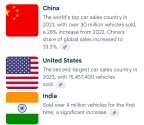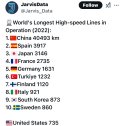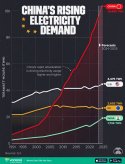Again, you better come up with some real evidence otherwise you are basically Pettis, but Chinese.I flat out don't believe Indian and some other countries' PPP adjusted GDP. Indian GDP PPP suggests an average Indian worker is half as productive as a Chinese one which is demonstrably not true.
You are using an out of date browser. It may not display this or other websites correctly.
You should upgrade or use an alternative browser.
You should upgrade or use an alternative browser.
Chinese Economics Thread
- Thread starter Norfolk
- Start date
I flat out don't believe Indian and some other countries' PPP adjusted GDP. Indian GDP PPP suggests an average Indian worker is half as productive as a Chinese one which is demonstrably not true.
The best to look at the comprehensive power of an economy is what it could buy.
China's economy can afford 30M vehicles to the US 15M. That's 200% that of the US.
India's ability is 1/7th that of China and 1/3rd that of the US.
Cars are just one of the easier things to measure along with power generation and consumption (where China is 200% of the US and 500% of India.)
There are a lot of other things that shows a far consumption level in China than the "largest" nominal GDP. India always consume many multiples less than China.
When the Pentagon complains about China having 230 times the shipbuilding capability of the US, it indicative of a challenge from a greater economy:

Just compare electricity production, food production, steel production, concrete production, car production, industrial robot installation, railway construction. China completely out matches India and any other country. The closest India comes to China in these is food production even then it's half what China produces, and they have much more people farming than China does. China is on an entirely different level. REAL economy wise China is WAY bigger than it's said GDP and it's not even close.Again, you better come up with some real evidence otherwise you are basically Pettis, but Chinese.
There are things like HSR, ships, steel, cement, semicon and other where China can consume the majority of the global total.
It is one thing to be able to buy more stuff than the US (which is a big deal since the US has nominally the world's largest GDP) but it is another thing to be able to afford more of something than the rest of the world combined.
If your neighbor has 4 cars while another has 3 and a lot of others have 2 then it is hard to figure out who has the most disposable income. But if one guy has a collection of 50 which is more than the rest of the neighborhood combined then it is pretty clear.
It is pretty clear with China.

It is one thing to be able to buy more stuff than the US (which is a big deal since the US has nominally the world's largest GDP) but it is another thing to be able to afford more of something than the rest of the world combined.
If your neighbor has 4 cars while another has 3 and a lot of others have 2 then it is hard to figure out who has the most disposable income. But if one guy has a collection of 50 which is more than the rest of the neighborhood combined then it is pretty clear.
It is pretty clear with China.

Again, if you're talking about "will Chinese manufacturing out produce the US in a war", then the answer is a resounding yes.Just compare electricity production, food production, steel production, concrete production, car production, industrial robot installation, railway construction. China completely out matches India and any other country. The closest India comes to China in these is food production even then it's half what China produces, and they have much more people farming than China does. China is on an entirely different level. REAL economy wise China is WAY bigger than it's said GDP and it's not even close.
But that is not GDP, which is simply transactions at market-based prices.
GDP denotes the total monetary value of all goods and services generated by the economy. Whether or not this GDP has anything to do with say, food consumption or car consumption, would depend on the country at hand.
If you are interested in comparing economies by say, food consumption, you can compare the kcal of vegetable/grain/meat/diary... etc directly. No need to convert the kcal of food into GDP.
GDP as a "god" that one must maximize is how you end up with imputed rent in the US going from 1% of the economy to 9% of the economy. From an investor's perspective, it is far easier to play with real estate than play with manufacturing/scientific enterprises. Increased rents in turn chokes other businesses as they need to pay more rent, and the cycle continues. Pretty soon you end up with an entire economy based on selling real estate.
If you are interested in comparing economies by say, food consumption, you can compare the kcal of vegetable/grain/meat/diary... etc directly. No need to convert the kcal of food into GDP.
GDP as a "god" that one must maximize is how you end up with imputed rent in the US going from 1% of the economy to 9% of the economy. From an investor's perspective, it is far easier to play with real estate than play with manufacturing/scientific enterprises. Increased rents in turn chokes other businesses as they need to pay more rent, and the cycle continues. Pretty soon you end up with an entire economy based on selling real estate.
Again, if you're talking about "will Chinese manufacturing out produce the US in a war", then the answer is a resounding yes.
China could only do that if it has the much bigger economy.
But that is not GDP, which is simply transactions at market-based prices.
GDP is being used as the main gauge of an economy. The transactions of a larger economy will obviously be more than that of a smaller economy.
What we see with Nominal is a wildly inaccurate gauge where the consumption and production ability of an economy that consumes and produces in multiples of another is somehow smaller. It is nonsensical and idiotic.
Again, there is no way in a logical universe where China can consume more than twice the electricity of the US and with its demand growing exponentially faster than the US can somehow be losing ground to the US as nominal GDP is trying tell (lie to) people:

Full story in the posted link.
Customers select products at a supermarket in Zaozhuang, east China's Shandong Province, Jan. 9, 2025. China's consumer price index (CPI), a main gauge of inflation, rose 0.2 percent year on year in 2024, official data showed Thursday. (Photo by Sun Zhongzhe/Xinhua)
BEIJING, Jan. 9 (Xinhua) -- China's inflation remained stable last year with mild consumer price growth and narrowing declines in producer prices as domestic demand continued to warm up amid sustained economic recovery.
China's consumer price index (CPI), a main gauge of inflation, rose 0.2 percent year on year in 2024, official data showed Thursday.
In December alone, the CPI edged up 0.1 percent from a year earlier, according to the National Bureau of Statistics (NBS). Core CPI, which excludes food and energy prices, last month rose 0.4 percent year on year, and was up from 0.3 percent in November 2024.
On a monthly basis, the CPI was flat in December, following a 0.6-percent decrease in November.
Thursday's NBS data also revealed that the producer price index (PPI), which measures costs of goods at the factory gate, went down 2.3 percent year on year in December, narrowing from a 2.5-percent drop in the previous month. Compared with November, the PPI inched down 0.1 percent.
In 2024, the national producer price declined by 2.2 percent, less than the 3-percent drop recorded in 2023.
Customers select fruit at a supermarket in Xinle, north China's Hebei Province, Jan. 9, 2025. China's consumer price index (CPI), a main gauge of inflation, rose 0.2 percent year on year in 2024, official data showed Thursday. (Photo by Jia Minjie/Xinhua)
A customer selects fruit and vegetables at a supermarket in Shijiazhuang, north China's Hebei Province, Jan. 9, 2025. China's consumer price index (CPI), a main gauge of inflation, rose 0.2 percent year on year in 2024, official data showed Thursday. (Photo by Liang Zidong/Xinhua)
Customers select fruit at a supermarket in Handan, north China's Hebei Province, Jan. 9, 2025. China's consumer price index (CPI), a main gauge of inflation, rose 0.2 percent year on year in 2024, official data showed Thursday. (Photo by Hao Qunying/Xinhua)
A customer selects fruit at a supermarket in Lianyungang, east China's Jiangsu Province, Jan. 9, 2025. China's consumer price index (CPI), a main gauge of inflation, rose 0.2 percent year on year in 2024, official data showed Thursday. (Photo by Wang Chun/Xinhua)
Customers select vegetables at a supermarket in Wuxi, east China's Jiangsu Province, Jan. 9, 2025. China's consumer price index (CPI), a main gauge of inflation, rose 0.2 percent year on year in 2024, official data showed Thursday. (Photo by Huan Yueliang/Xinhua)
A customer selects fruit at a supermarket in Zunhua, north China's Hebei Province, Jan. 9, 2025. China's consumer price index (CPI), a main gauge of inflation, rose 0.2 percent year on year in 2024, official data showed Thursday. (Photo by Liu Mancang/Xinhua)
A customer selects vegetables at a supermarket in Nanjing, east China's Jiangsu Province, Jan. 9, 2025. China's consumer price index (CPI), a main gauge of inflation, rose 0.2 percent year on year in 2024, official data showed Thursday. (Photo by Su Yang/Xinhua)
Customers select products at a supermarket in Zaozhuang, east China's Shandong Province, Jan. 9, 2025. China's consumer price index (CPI), a main gauge of inflation, rose 0.2 percent year on year in 2024, official data showed Thursday. (Photo by Sun Zhongzhe/Xinhua)
BEIJING, Jan. 9 (Xinhua) -- China's inflation remained stable last year with mild consumer price growth and narrowing declines in producer prices as domestic demand continued to warm up amid sustained economic recovery.
China's consumer price index (CPI), a main gauge of inflation, rose 0.2 percent year on year in 2024, official data showed Thursday.
In December alone, the CPI edged up 0.1 percent from a year earlier, according to the National Bureau of Statistics (NBS). Core CPI, which excludes food and energy prices, last month rose 0.4 percent year on year, and was up from 0.3 percent in November 2024.
On a monthly basis, the CPI was flat in December, following a 0.6-percent decrease in November.
Thursday's NBS data also revealed that the producer price index (PPI), which measures costs of goods at the factory gate, went down 2.3 percent year on year in December, narrowing from a 2.5-percent drop in the previous month. Compared with November, the PPI inched down 0.1 percent.
In 2024, the national producer price declined by 2.2 percent, less than the 3-percent drop recorded in 2023.
Customers select fruit at a supermarket in Xinle, north China's Hebei Province, Jan. 9, 2025. China's consumer price index (CPI), a main gauge of inflation, rose 0.2 percent year on year in 2024, official data showed Thursday. (Photo by Jia Minjie/Xinhua)
A customer selects fruit and vegetables at a supermarket in Shijiazhuang, north China's Hebei Province, Jan. 9, 2025. China's consumer price index (CPI), a main gauge of inflation, rose 0.2 percent year on year in 2024, official data showed Thursday. (Photo by Liang Zidong/Xinhua)
Customers select fruit at a supermarket in Handan, north China's Hebei Province, Jan. 9, 2025. China's consumer price index (CPI), a main gauge of inflation, rose 0.2 percent year on year in 2024, official data showed Thursday. (Photo by Hao Qunying/Xinhua)
A customer selects fruit at a supermarket in Lianyungang, east China's Jiangsu Province, Jan. 9, 2025. China's consumer price index (CPI), a main gauge of inflation, rose 0.2 percent year on year in 2024, official data showed Thursday. (Photo by Wang Chun/Xinhua)
Customers select vegetables at a supermarket in Wuxi, east China's Jiangsu Province, Jan. 9, 2025. China's consumer price index (CPI), a main gauge of inflation, rose 0.2 percent year on year in 2024, official data showed Thursday. (Photo by Huan Yueliang/Xinhua)
A customer selects fruit at a supermarket in Zunhua, north China's Hebei Province, Jan. 9, 2025. China's consumer price index (CPI), a main gauge of inflation, rose 0.2 percent year on year in 2024, official data showed Thursday. (Photo by Liu Mancang/Xinhua)
A customer selects vegetables at a supermarket in Nanjing, east China's Jiangsu Province, Jan. 9, 2025. China's consumer price index (CPI), a main gauge of inflation, rose 0.2 percent year on year in 2024, official data showed Thursday. (Photo by Su Yang/Xinhua)
China could only do that if it has the much bigger economy.
GDP is being used as the main gauge of an economy. The transactions of a larger economy will obviously be more than that of a smaller economy.
What we see with Nominal is a wildly inaccurate gauge where the consumption and production ability of an economy that consumes and produces in multiples of another is somehow smaller. It is nonsensical and idiotic.
Again, there is no way in a logical universe where China can consume more than twice the electricity of the US and with its demand growing exponentially faster than the US can somehow be losing ground to the US as nominal GDP is trying tell (lie to) people:
We are not in a kinetic war - so using 'wartime measures' of how China can win is an irrelevant gauge of Chinese economic wellbeing in peace time.
If your frame of reference is that Chinese people work harder (to produce more) while making less (nominal wages) per hour of incremental work they put in to satisfy your wet dreams of China winning in a hypothetical war, then you do you.
We are not in a kinetic war - so using 'wartime measures' of how China can win is an irrelevant gauge of Chinese economic wellbeing in peace time.
If your frame of reference is that Chinese people work harder (to produce more) while making less (nominal wages) per hour of incremental work they put in to satisfy your wet dreams of China winning in a hypothetical war, then you do you.
Idiotic. The main crust of my post is that China is a far bigger economy because the consumption figures of everything -- cars, steel, electricity, etc. -- are in multiples of the US. Chinese people can and do buy more than anyone else in the world. They enjoy the latest in cellphones, games, HDTVs, autos and other goods and luxuries in far larger quantities than any economy in the West, including the US.
War is actually the weakest part of these equation. China only uses 1.6% of its economic might on the military.
The point is simply this -- there is no way that economy of a country that consumes twice as electricity as the US and whose demand is growing exponentially faster than the US can be smaller than that of the US or being losing ground to the US when the US demand in electricity has basically flatlined over the past decade.
China is the far bigger economy in peacetime and given the time to develop, it would only build upon figures that suggest that China might already be twice the size of the US economy. To be honest the only advantage the US has is in war. It certainly not in the economy.
